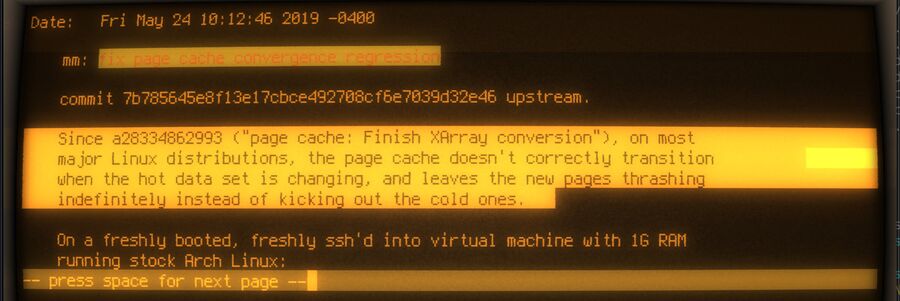New Kernels: 5.1.16, 4.19.57 and 4.14.132 released with mostly network-related fixes
5.1.16 has a important fix for a page cache regression which has been present since version 4.20. The earlier long-term support kernels never had that problem. Most of the other changes are network-related. There's also fixes for some rare edge-case crashes which are unlikely to happen unless you run a stress-test in an effort to make the kernel crash.
The seemingly minor fix page cache convergence regression fix in 5.1.16 stands out as being particularly interesting and important. Linux's caching mechanism has apparently been broken since 4.20 without anyone actually noticing.
Johannes Weiner describes the regression as:
"Since a28334862993 ("page cache: Finish XArray conversion"), on most major Linux distributions, the page cache doesn't correctly transition when the hot data set is changing, and leaves the new pages thrashing indefinitely instead of kicking out the cold ones.
(..)
As a result, we basically maintain no non-resident information for the workloads running on the system, thus breaking the caching algorithm."
As Linux Torvalds recently explained on the Linux Kernel Mailing List, Caches Are Faster than Direct IO so the performance-impact of a non-working caching algorithm can be quite significant. This alone may be a good reason to upgrade to 5.1.16. Kernels earlier than 4.20 never had this particular problem.
The rest of the changes in the changelog's look uninteresting. There are some network-related performance improvements in 5.1.16, 4.19.57 and 4.14.132 which relate to more specialized setups like a VLANs above bonded and teamed devices. A bug in page_idle.c which could cause a kernel crash, fixed in these kernels, was slightly notable but it wasn't really a problem unless you decided to run sudo stress-ng --idle-page 0 for some reason - and do note the sudo, stress-ng won't do much unless you run it as root.
The full changelog's for these new kernels can be read at:
- https://cdn.kernel.org/pub/linux/kernel/v5.x/ChangeLog-5.1.16
- https://cdn.kernel.org/pub/linux/kernel/v4.x/ChangeLog-4.19.57
- https://cdn.kernel.org/pub/linux/kernel/v4.x/ChangeLog-4.14.132
And their source can, as always, be grabbed from https://www.kernel.org/
published 2019-03-07 - last edited 2019-07-03



Enable comment auto-refresher